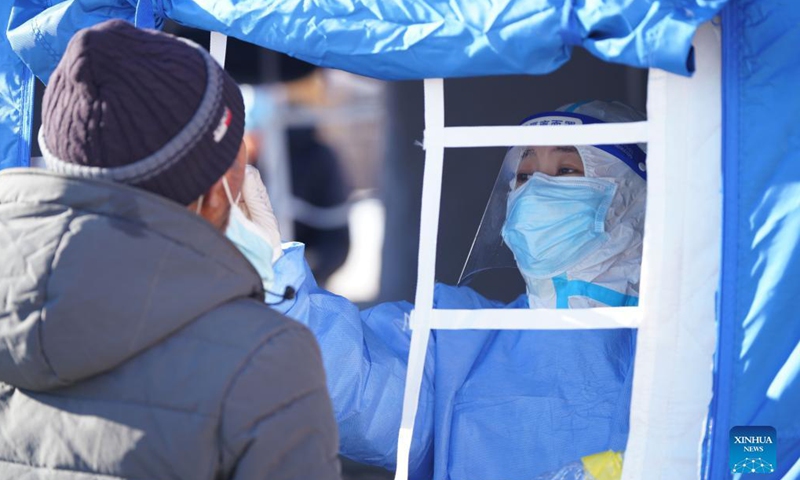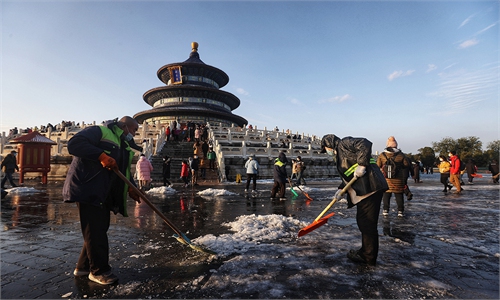Frontline anti-epidemic workers win kudos for grappling with sweeping cold wave and COVID-19

A medical worker takes a swab sample from a resident for nucleic acid testing in Henantun Village of Xingfu Town in Heihe, northeast China's Heilongjiang Province, Nov. 7, 2021.Photo:Xinhua
Frontline Chinese anti-epidemic workers, who are grappling with dual threats posed by a sweeping cold wave and the COVID-19 epidemic, are winning kudos from society for their arduous work.
China continued to report new domestically transmitted cases as a cold wave swept major parts across the country, but health experts and officials said the cold is unlikely to have an impact on the overall trend of the epidemic.
The Chinese mainland reported 65 confirmed cases on Sunday involving 11 provincial regions. At least 20 provincial-level regions had reported COVID-19 cases in the latest wave.
Heavy snow will continue to fall in northern and northeastern parts of China early this week, mostly affecting Inner Mongolia and three provinces in Northeast China. Meteorologists said the cold wave will continue southward, and temperatures nationwide will remain low for the next 10 days.
An official from the Chinese Center for Disease Control and Prevention told the Global Times on Monday that plunging temperatures and heavy snowfalls are making anti-epidemic work a lot harder.
Efforts of frontline anti-epidemic staff members are an essential part of the zero-tolerance policy. Local governments must provide essential resources to keep people warm, as well as support residents who are undergoing quarantine with necessary heating facilities, the official said.
To cope with the dual threats of the heavy snow and the epidemic resurgence, the Gansu provincial government has extended the period of validity of nucleic acid tests from 24 hours to 48 hours in cases where people from epidemic-free regions want to leave the province.
Cities in Gansu such as Lanzhou and Jiuquan offered tents, coats and heaters to ensure the warmth of anti-epidemic personnel who work outdoors. Gansu had reported 140 confirmed cases in five cities as of press time.
Blizzards and sleet continued to hit the entire province of Heilongjiang on Monday, causing icy roads, frozen electricity lines and poor visibility, according to the Heilongjiang Meteorological Bureau.
Frontline medical staff and other anti-epidemic personnel have to get to work earlier than usual to deal with any possible emergency. Workers cleared snow from the roads early in the morning so as to allow timely nucleic acid tests for residents, a government employee from Xinji, a city in Hebei Province, told the Global Times on Monday.
"We managed to get all the work done and not have the anti-epidemic work affected," the employee said.
To ensure no viral cross-transmission, Beijing ordered that snow in epidemic-related enclosed and controlled areas be stacked and melted on the spot in the enclosed area. Such snow is not allowed to be transported out of the area.
"Snow didn't stop the steps of the anti-epidemic working staff! Hope the snowfall will bring good luck to the city," a netizen posted on social media on Sunday, showing respect to medical staffers who gave tests to local residents in Gansu in the snow.
A video showing some medical staff in Lanzhou having lunch in the snow after finishing the collection of test samples was widely circulated online, with netizens blessing them and thanking them for their efforts and dedication to the city.
Wang Guangfa, a Beijing-based expert who specializes in epidemiology, believed the cold wave won't worsen the overall epidemic in China because the outbreak is now sporadic across provinces. As long as precise epidemic control and prevention steps are well implemented despite the extreme weather, the epidemic can be contained.
North China's Inner Mongolia, which has 94 confirmed cases, issued a red warning for blizzards on Monday morning, which were expected within six hours.
Heavy blizzards are likely to hit a large part of the region with an average of 10-20 millimeters of snow. Tongliao suspended its local schools, kindergartens and airports starting from Sunday. Some roads were covered with more than 50 centimeters of snow.


